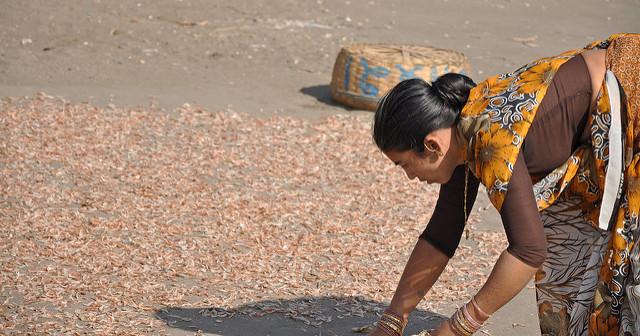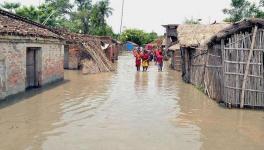How Ocean Grabbing is Threatening the Livelihoods of Women Fishworkers

Credits: I for Detail/Flickr
With climate change and rapid privatization of the seas and oceans, small-scale fisherpeople are being denied food sovereignty and their right to livelihood. As this happens, fisher-women are suffering even more. They already face discrimination and lack of access to basic facilities, and as ocean grabbing increases, women are burdened further.
Women traditionally do not go deep into sea waters for catching fish. They are involved in fishing in lakes and nearshore waters in some countries and islands. A majority of women fish workers, however, engage in pre-harvest and post-harvest work. This includes collecting and preparing bait, mending nets and boats before the harvest, and processing and selling of fishes after they are caught.
Fish vending employs more women than men in India. According to Marine Fisheries Census of 2010, nearly 81.8% of the fisherfolks engaged in marketing of fish were women.
But making a living from selling fish is getting harder. The seas are now dominated by huge corporate fishing vessels, making it hard for the small-scale fisherfolk to access fish. The women who are making a living by selling procured fish are not able to get fish anymore, taking their income away.
Fish-working women in Kenya and other African countries involved in selling fish often face violence when they go out to harbours for procuring. In many cases, men demand sex in exchange for fish, a practice known as “sex-for-fish”.
Women also procure fish such as prawns from shores around mangrove forests. But mangroves are increasingly facing destruction. In Sunderbans, there was an oil spill in 2014, which killed aquatic life in the waters around it. Many aquaculture grounds are being constructed around mangroves which pollutes them. This leads to fish dying or migrating. As mangroves are being destroyed, the livelihood of women who rely on them is being threatened.
Women constitute about 47 percent of fish workers, accounting for around 56 million jobs along the fisheries supply chain.(World Bank, 2012). But they are still facing great obstacles in getting recognition for their contribution. The work they perform in fisheries is mostly disregarded as an extension of housework, and not recognised in official statistics.
The fight for better rights for women has been a part of the larger struggle for the conservation of small-scale fisheries. In the 7th General Assembly of the World Forum of Fisher Peoples held in Delhi last week, the problems affecting women fish workers were discussed. Delegates from more than 40 countries came for these discussions and demanded national and international attention.
Get the latest reports & analysis with people's perspective on Protests, movements & deep analytical videos, discussions of the current affairs in your Telegram app. Subscribe to NewsClick's Telegram channel & get Real-Time updates on stories, as they get published on our website.























